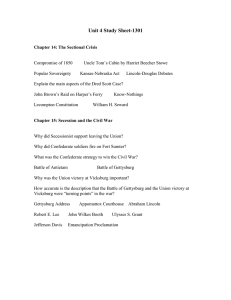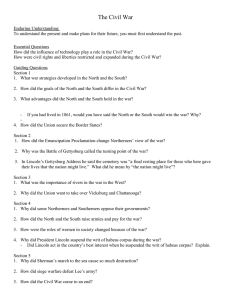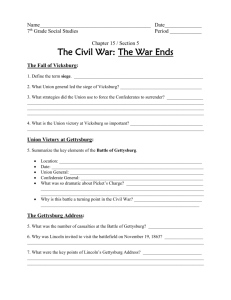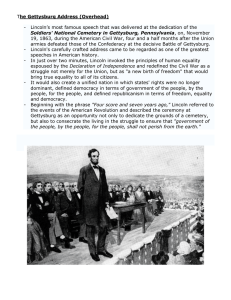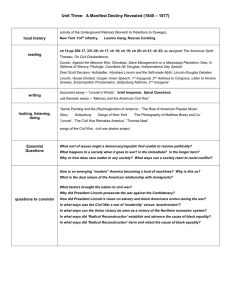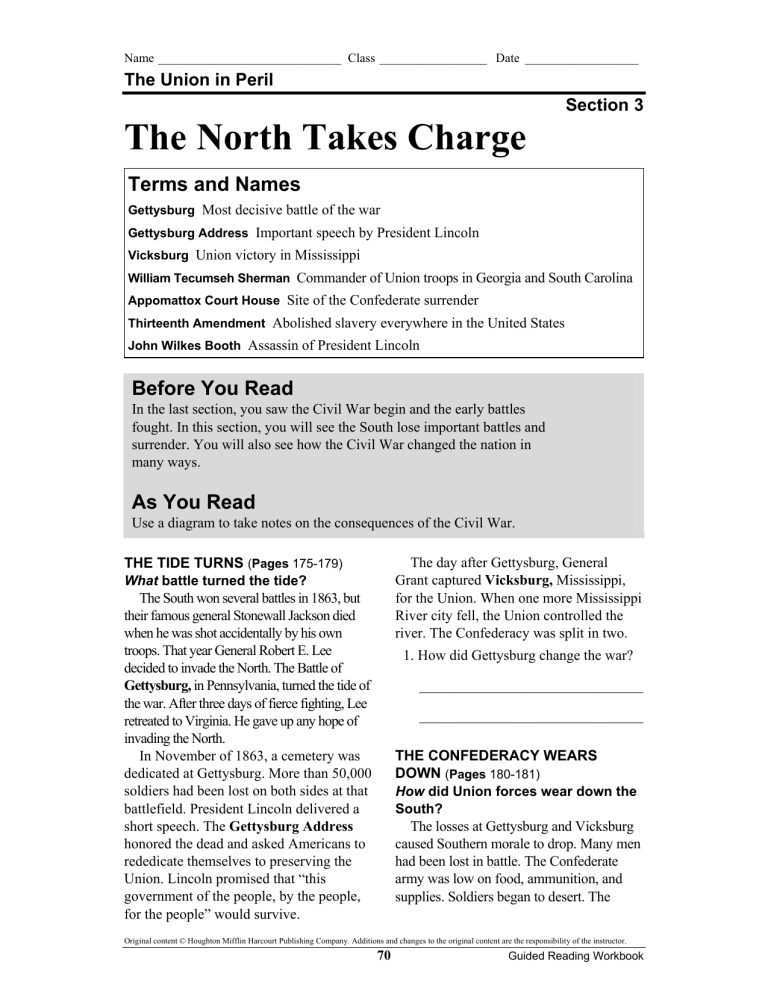
Name _____________________________ Class _________________ Date __________________ The Union in Peril Section 3 The North Takes Charge Terms and Names Gettysburg Most decisive battle of the war Gettysburg Address Important speech by President Lincoln Vicksburg Union victory in Mississippi William Tecumseh Sherman Commander of Union troops in Georgia and South Carolina Appomattox Court House Site of the Confederate surrender Thirteenth Amendment Abolished slavery everywhere in the United States John Wilkes Booth Assassin of President Lincoln Before You Read In the last section, you saw the Civil War begin and the early battles fought. In this section, you will see the South lose important battles and surrender. You will also see how the Civil War changed the nation in many ways. As You Read Use a diagram to take notes on the consequences of the Civil War. THE TIDE TURNS (Pages 175-179) What battle turned the tide? The South won several battles in 1863, but their famous general Stonewall Jackson died when he was shot accidentally by his own troops. That year General Robert E. Lee decided to invade the North. The Battle of Gettysburg, in Pennsylvania, turned the tide of the war. After three days of fierce fighting, Lee retreated to Virginia. He gave up any hope of invading the North. In November of 1863, a cemetery was dedicated at Gettysburg. More than 50,000 soldiers had been lost on both sides at that battlefield. President Lincoln delivered a short speech. The Gettysburg Address honored the dead and asked Americans to rededicate themselves to preserving the Union. Lincoln promised that “this government of the people, by the people, for the people” would survive. The day after Gettysburg, General Grant captured Vicksburg, Mississippi, for the Union. When one more Mississippi River city fell, the Union controlled the river. The Confederacy was split in two. 1. How did Gettysburg change the war? _______________________________ _______________________________ THE CONFEDERACY WEARS DOWN (Pages 180-181) How did Union forces wear down the South? The losses at Gettysburg and Vicksburg caused Southern morale to drop. Many men had been lost in battle. The Confederate army was low on food, ammunition, and supplies. Soldiers began to desert. The Original content © Houghton Mifflin Harcourt Publishing Company. Additions and changes to the original content are the responsibility of the instructor. 70 Guided Reading Workbook Name _____________________________ Class _________________ Date __________________ Section 3, continued The war widened the economic gap between North and South. The Northern economy boomed as the region produced goods of many kinds. The Southern economy collapsed. The labor system of slavery was gone. Southern industry and railroads were destroyed. Many farms were also in ruins. The Civil War was also one of the first modern wars. It saw such deadly technological advances as the rifle and minié ball. The development of the ironclad ship led to the end of wooden war ships, and changed the nature of war forever. South was exhausted and had few resources left. Some people called for peace. Meanwhile, Lincoln made U.S. Grant commander of all Union armies. Grant gave William Tecumseh Sherman command of the military division of the Mississippi. Both generals believed in waging total war. Not only did they fight the Confederate army; their goal was to destroy the Southern population’s will to fight. Grant fought Lee’s army in Virginia. At the same time, Sherman’s army invaded Georgia and marched across the state to the sea, destroying cities and farms as they went. Lincoln feared he would not be re-elected in 1864. Many Northerners felt the war had gone on too long and had caused too much destruction. But news of Sherman’s victories helped Lincoln win a second term. On April 3, 1865 Union troops conquered Richmond. On April 9, Generals Lee and Grant met in Appomattox Court House, Virginia, and arranged the Confederate surrender. Lincoln insisted the terms be generous. Confederate soldiers were allowed to go home, not taken prisoner. The Civil War was over. 3. What were two ways in which the Civil War changed the nation? _______________________________ _______________________________ THE WAR CHANGES LIVES (Pages 182-183) How was the life of African Americans changed? The situation of African Americans changed dramatically after the war. In 1865, the Thirteenth Amendment to the Constitution abolished slavery everywhere in the United States. Only five days after Lee surrendered at Appomattox, President Lincoln was shot by a Southern sympathizer. Lincoln was at a play in Ford’s Theater in Washington, D.C., when John Wilkes Booth shot him. He died the next day. Lincoln’s body was carried by train from Washington to his hometown of Springfield, Illinois. Seven million people, or almost one-third of the Union population, turned out to pay their respects. 2. Why did Lincoln fear he might not be reelected? ______________________________ ______________________________ THE WAR CHANGES THE NATION (Pages 181-182) How did the Civil War change the nation? The Civil War changed the nation in many ways. It exacted a high price in terms of human life. Approximately 360,000 Union soldiers and 260,000 Confederates died. The war also brought political change in the ways the federal government increased its power through such measures as conscription and the income tax. 4. How was slavery finally abolished in the United States? _______________________________ _______________________________ Original content © Houghton Mifflin Harcourt Publishing Company. Additions and changes to the original content are the responsibility of the instructor. 71 Guided Reading Workbook

